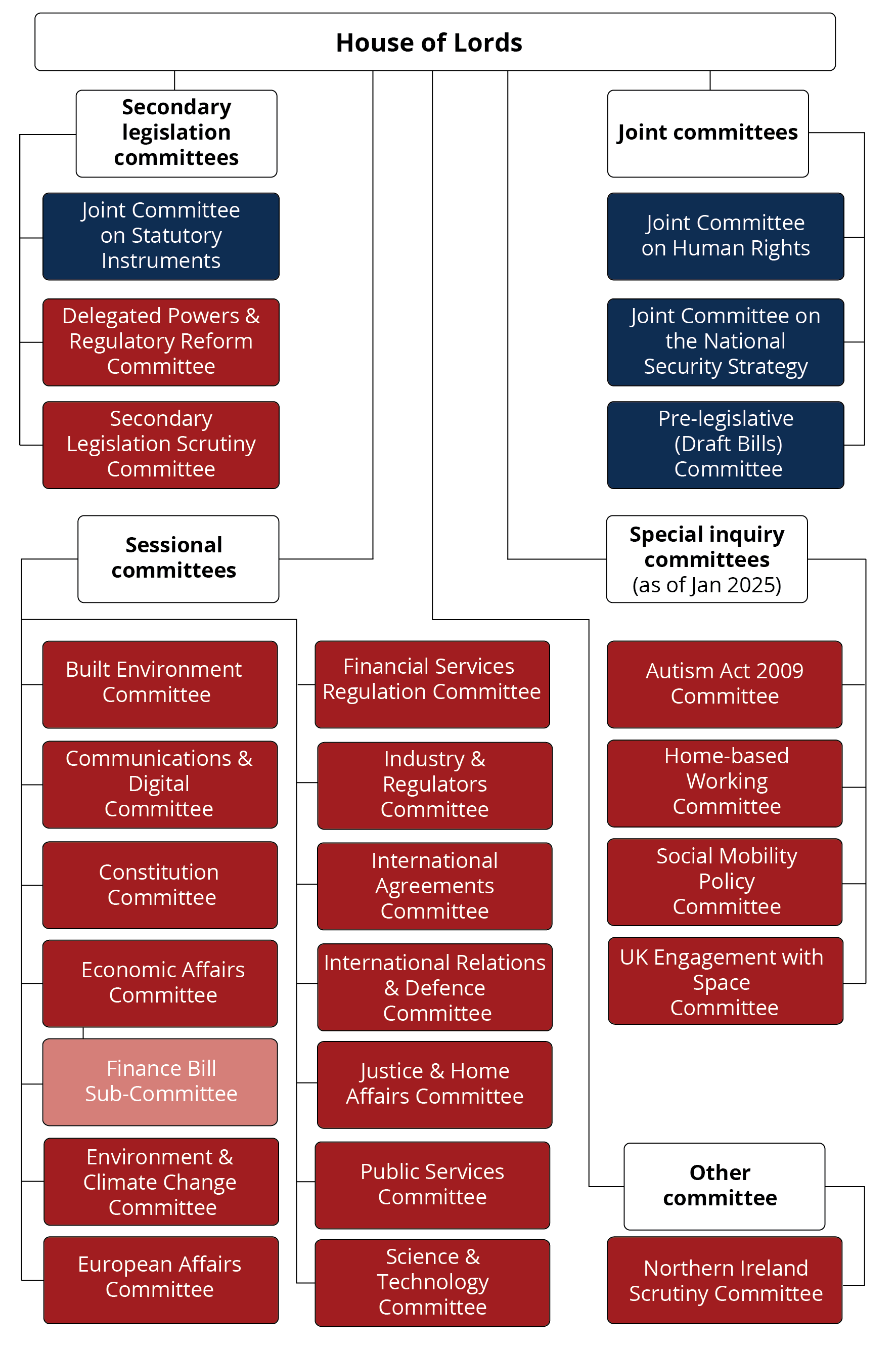What did Lords Select Committees do in 2024/25?
A review of our committee activity
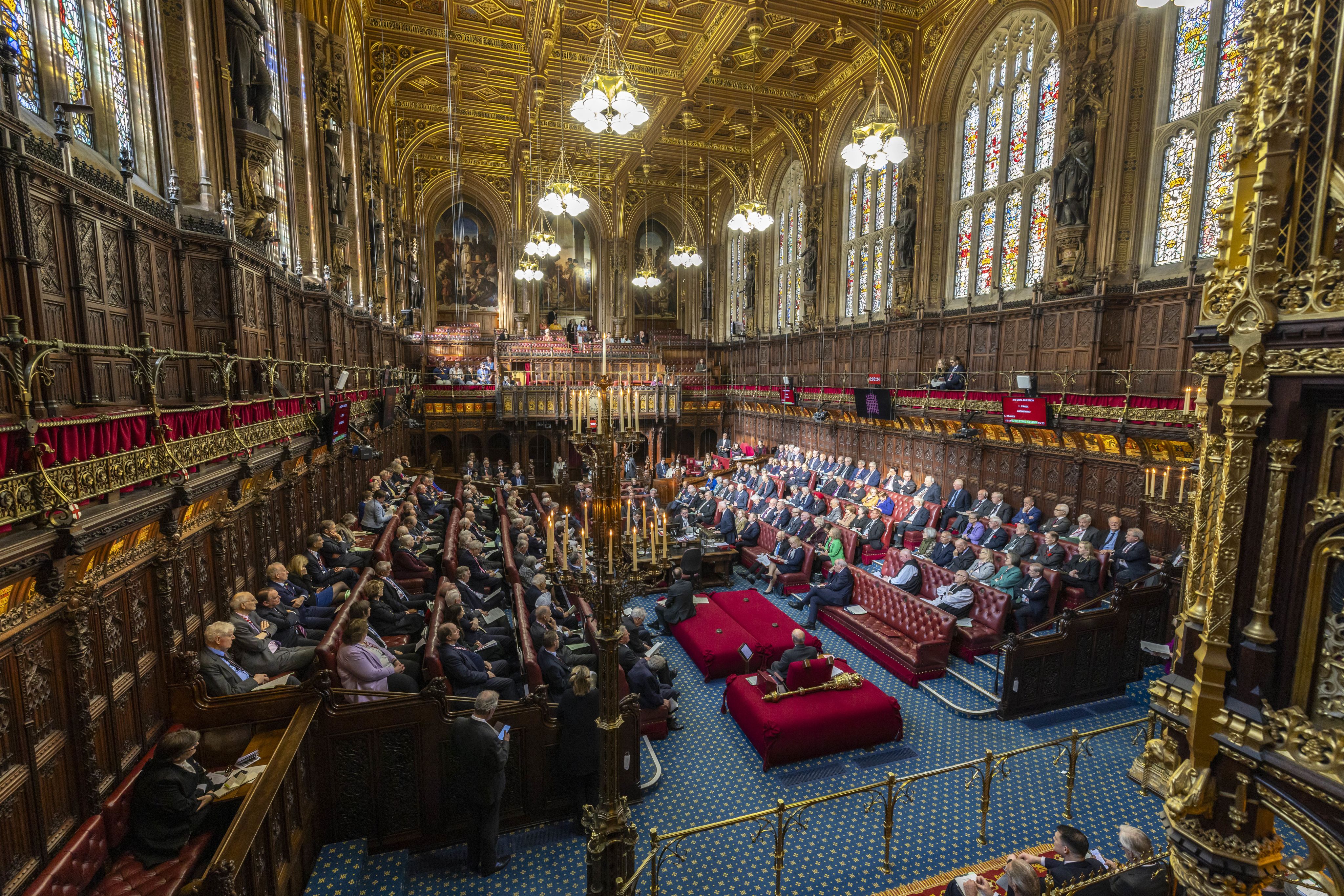
An essential role
House of Lords committee work forms a key part of the role of the second Chamber.
Committees examine and help develop public policy, scrutinise and improve legislation, hold the Government to account, promote public debate on key issues and engage with the public and civil society.
Every year, the House of Lords Liaison Committee publishes an overview of the work carried out by Lords committees. This year committees were impacted by the July 2024 general election, which resulted in a three month pause. However, committees were back up and running as soon as possible after the election.
This year's review found that committees had:
- held 469 committee meetings
- heard from 700 witnesses
- received 1439 written submissions; and
- published 41 reports.
Committees structure
The current committee structure is as follows:
The House appointed a new committee this year, the Northern Ireland Scrutiny Committee. This will continue the valuable work of the former Sub-Committee of the European Affairs Committee on the Windsor Framework. In March 2025, the Committee launched its first inquiry into Strengthening Northern Ireland’s voice.
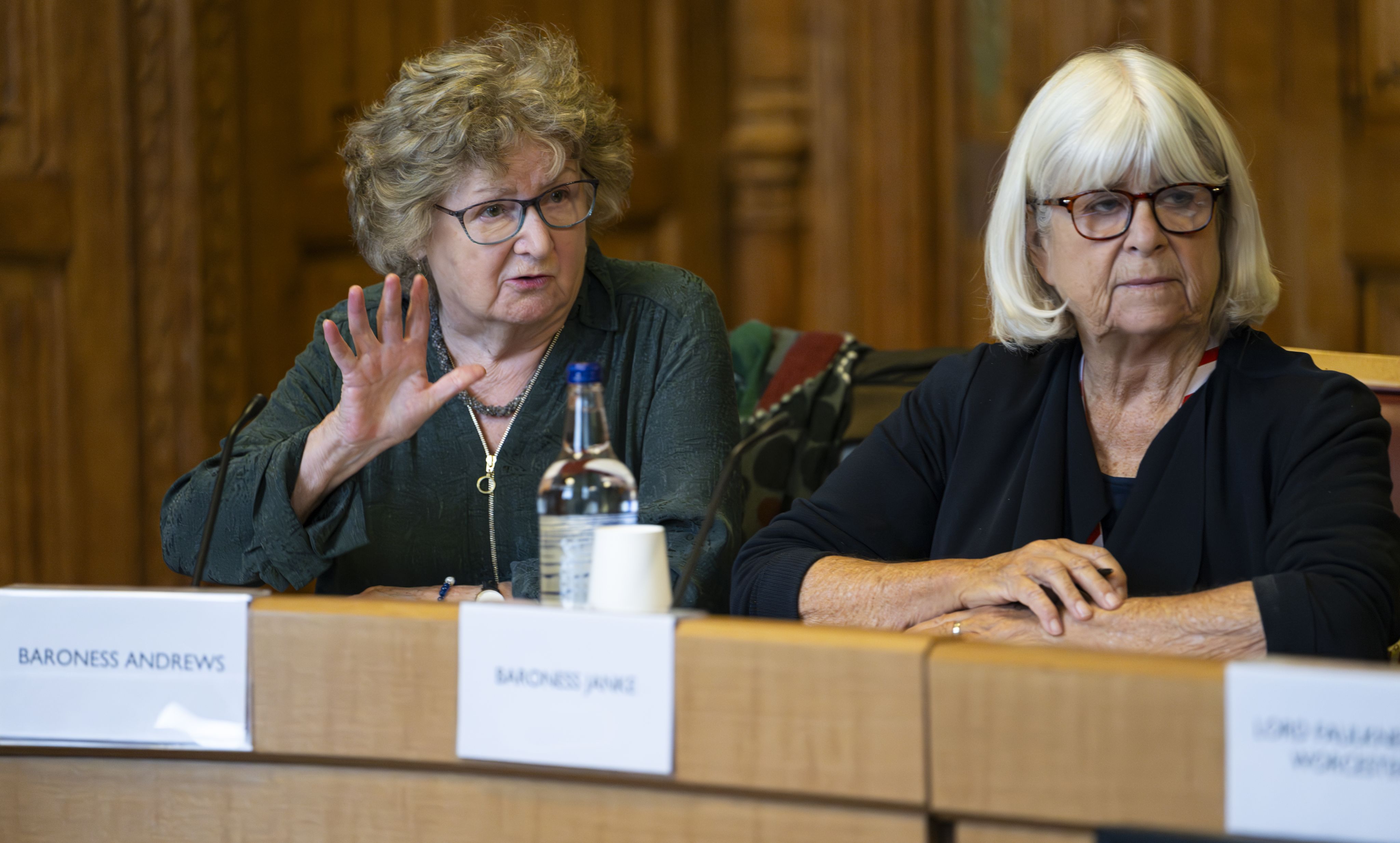
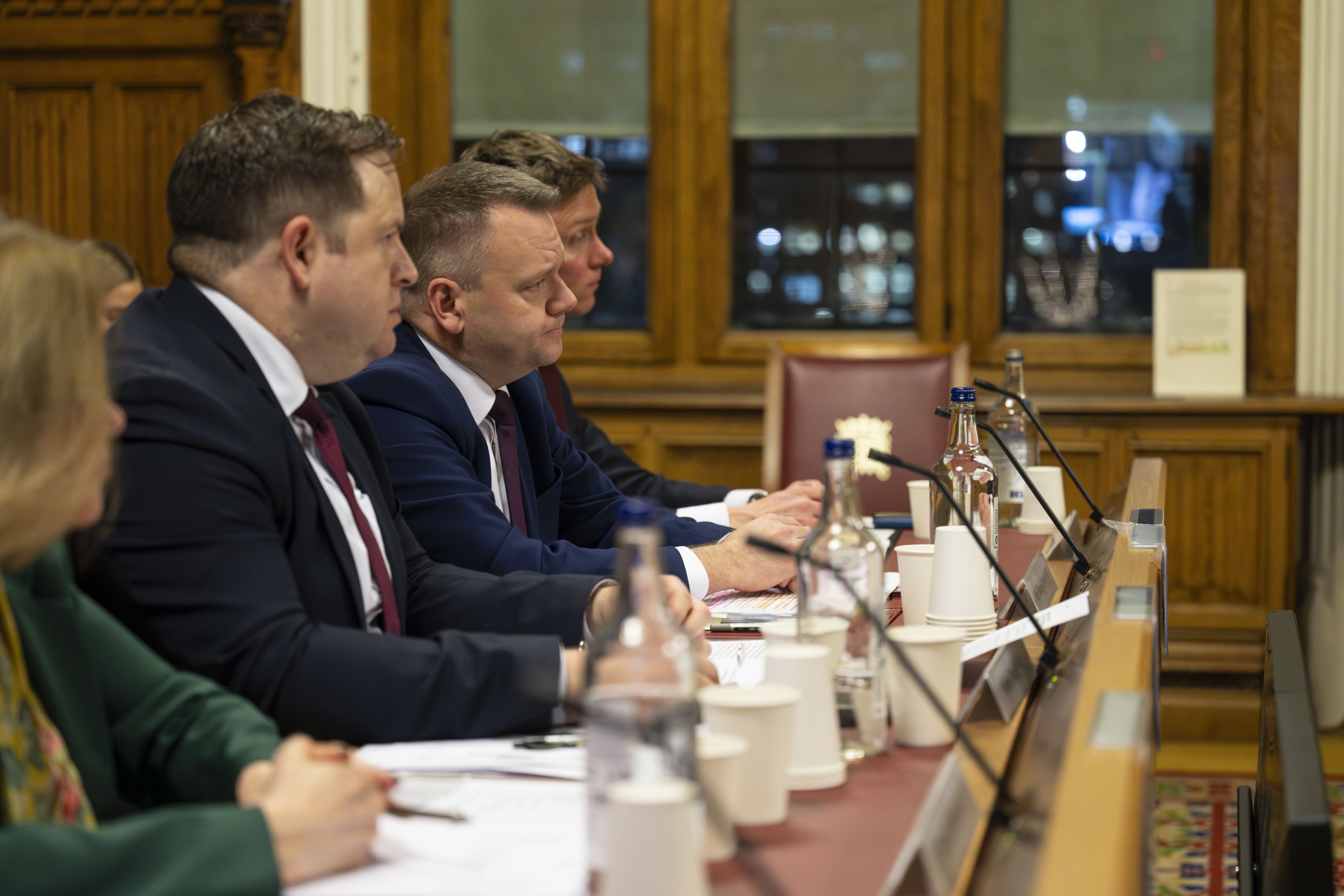
Sessional committees
The House of Lords has permanent committees, known as sessional committees, with broad remits. Sessional committees examine a wide range of policies and proposed laws across both short and longer-term inquiries.
In November 2024 the Built Environment Committee published a report on the future of the High Street, highlighting the need for local authorities and communities to work together to regenerate high streets in England so they can continue to work for communities in the future.
The Communications and Digital Committee had a positive response from the Government on their report on large language models, with recommendations being taken forward such as developing safety tests for high-risk AI models.
The Constitution Committee published two significant reports on the governance of the Union and executive oversight and responsibility for the UK Constitution. The Committee also continued its legislative scrutiny role with six reports this year, including on the Post Office (Horizon System) Offences Bill and the Great British Energy Bill.
The Financial Services Regulation Committee published its first report in February 2025, and concluded that the Financial Conduct Authority’s (FCA) proposal to publicise enforcement investigations before they are concluded was not convincing. The FCA subsequently informed the Committee it would not proceed with the proposal. The UK’s finances were the focus of the Economic Affairs Committee report on the national debt. The Committee recommended a new fiscal framework requiring the Government to set out how debt as a proportion of gross domestic product will be lower on a given date five years ahead.
In October 2024, the Industry and Regulators Committee concluded its work on skills policy writing to the Minister for Employment with a series of recommendations. The Government response accepted the Committee’s main recommendations which the Committee hopes will be considered in the development of Skills England and the Growth and Skills Levy.
The Public Services Committee continued to follow up on their work into homecare medicine services, and its recommendation that a Senior Responsible Officer should be appointed to oversee the service has now been implemented.
Annual evidence sessions are a way for sessional committees to ensure accountability and effective scrutiny, such as the Communications and Digital Committee’s annual session with the BBC. Committees also hold one-off evidence sessions on specific topics, such as the Science and Technology Committee one-off sessions on the UK’s pandemic preparedness and visas for STEM talent, both of which resulted in the Committee writing to the responsible Minister.
Several sessional committees have an international focus to their work. In March 2025 the International Agreements Committee published its report into the UK-Ukraine 100 Year Partnership Agreement. The Committee called for a debate on the Agreement and in order to do this within the required time under the Constitutional Reform and Governance Act 2010 (CRAG), the Government granted the first significant extension of the treaty scrutiny period.
At the end of last year, the International Relations and Defence Committee concluded its inquiry into the lessons of the war in Ukraine for UK Defence and found that serious weaknesses in the UK’s military strength had been exposed by the conflict and called for the Government to spend more on defence and invest wisely.
In November 2024 the European Affairs Committee held the first committee evidence sessions with the new Minister in the Cabinet Office responsible for EU relations and the Minister for Europe in the Foreign Office focusing on developments in EU relations. The Committee is currently considering the Government’s UK-EU ‘reset’.
The scrutiny committees working on secondary legislation have continued to work at pace with the Delegated Powers and Regulatory Reform Committee publishing 26 reports, the Joint Committee on Statutory Instruments publishing 24 reports and the Secondary Legislation Scrutiny Committee (SLSC) publishing 27 reports. The SLSC highlighted that there have been a series of instruments dealing with correcting (potentially) unlawful government practices and called for oversight and coordination of these instances at the centre of government.
The joint committees (involving both Lords and MPs) have also been busy, with the Joint Committee on Human Rights calling for stronger measures to require openness from public bodies in investigations and inquiries. The Prime Minister subsequently announced a “Hillsborough Law” will be implemented to require a legal duty of candour for public bodies. The Joint Committee on the National Security Strategy is currently considering the security of the UK’s undersea telecommunications cables.
Special inquiry committees
Every year Members of the House submit proposals for special inquiry committees. Typically, four committees are chosen, these are fixed term and are appointed to fulfil a focused remit. In the past year, committees on Food, Diet and Obesity, the Modern Slavery Act 2015, Preterm Birth and Statutory Inquiries have concluded their work.
The Modern Slavery Act 2015 Committee made a series of recommendations including that the UK’s immigration policy should differentiate between those migrants who come to the UK willingly and those who have been trafficked, the need for an arms-length Single Enforcement Body to act as the point of contact for labour exploitation across all sectors, and for legislation to require companies to meet the threshold to carry out modern slavery due diligence in their supply chains. The Government response accepted many of the recommendations and set out that these will be ‘valuable’ as the Government implements a reformed modern slavery system.
From the 45 proposals received last year, the four current special inquiry committees were appointed to consider:
- The Autism Act 2009
- Home-working
- Social Mobility policy
- The UK’s engagement with space
Special inquiry committees end upon publication of their reports and consequently the Liaison Committee carries out follow-up work. This year the Liaison Committee has written follow-up letters to Ministers on committees including Adult Social Care and Sport and Recreation
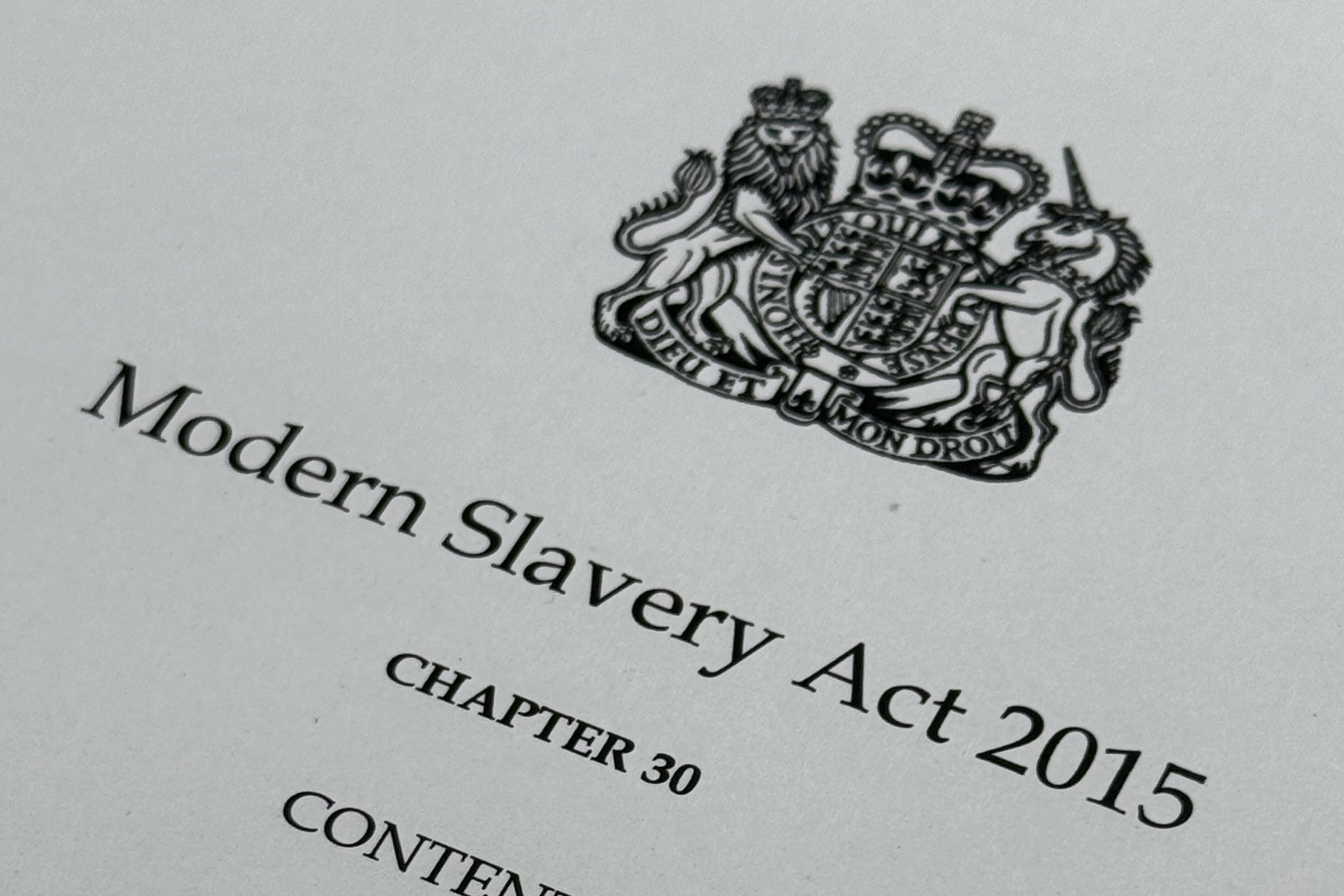
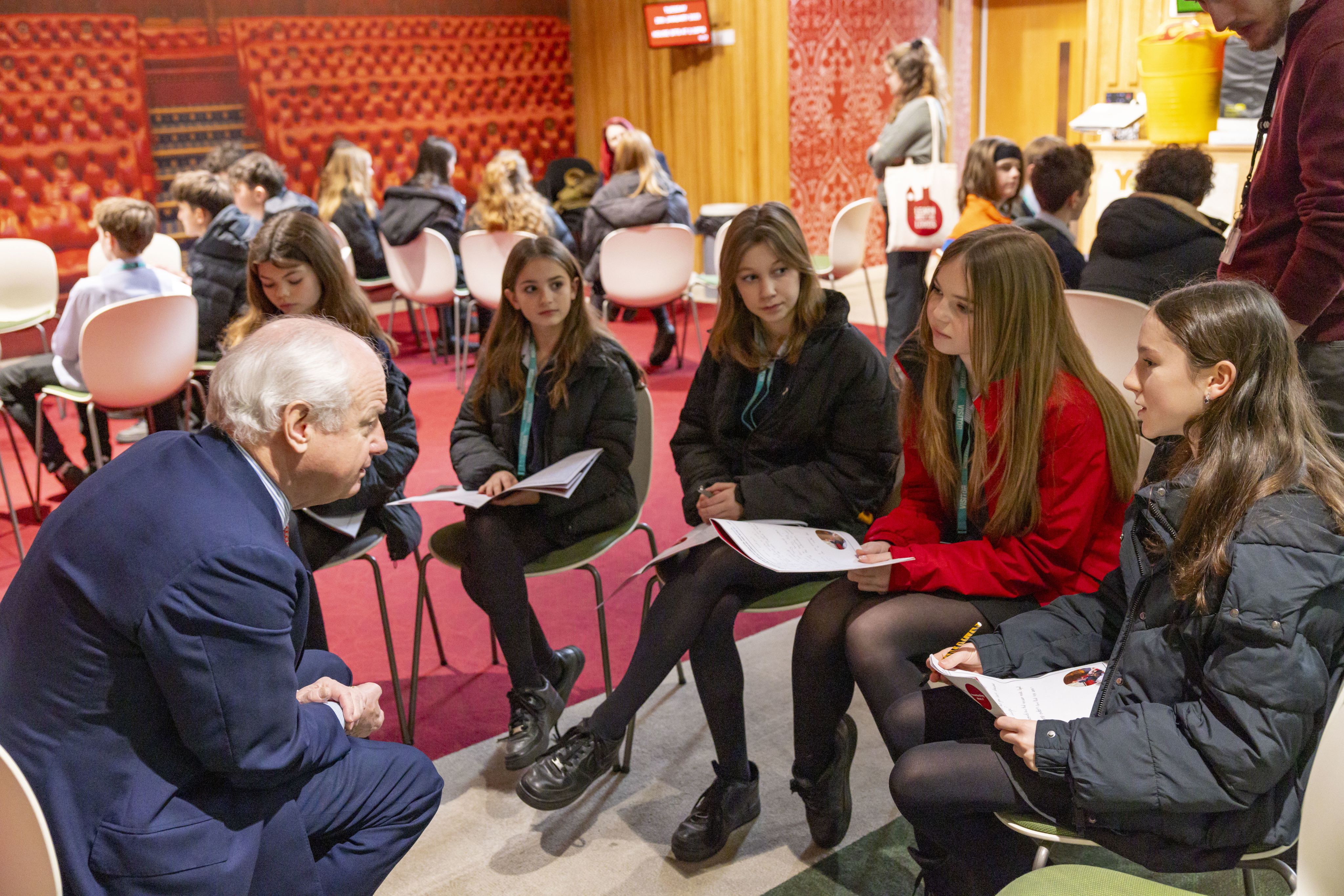
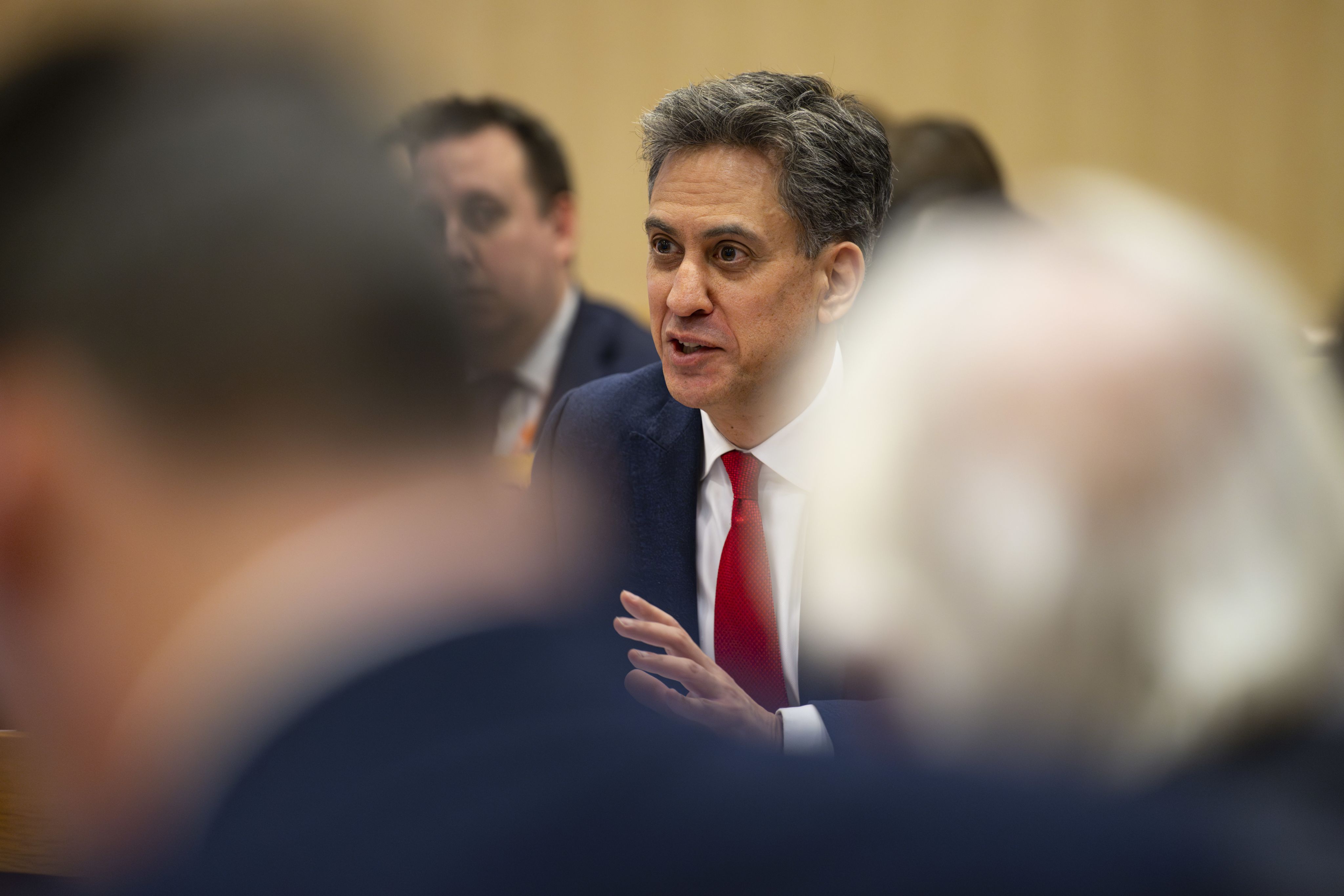

Gathering evidence and communicating with the public
Committees use a range of methods to hear evidence and contribute to public debate on key issues.
Roundtables are a valuable way to hear a range of views and for Members to speak directly to those engaged with or affected by a particular issue.
The Modern Slavery Act 2015 Committee hosted a private roundtable to hear from survivors of modern slavery to inform its inquiry and held a follow-up event after the publication of its report to hear feedback from participants.
The impact of the proposed agreement to transfer sovereignty of the Chagos Islands to Mauritius was the focus of a virtual roundtable with Chaggosian representatives held by the International Relations and Defence Committee.
The Environment and Climate Change Committee continued to run its Youth Engagement Programme, welcoming a third cohort of students from across the UK, including from a Special Educational Needs and Disabilities school, to participate in its work. This involved students coming to Parliament and Members visiting the schools who are taking part.
The Public Services Committee published its report into the transition from education to employment for young disabled people in easy read, British Sign Language and audio recording formats. This ensured that the Committee’s work was as accessible as possible to those who had participated in the inquiry and are affected by the Committee’s findings.
Committees have worked together to carry out effective scrutiny; the Environment and Climate Change Committee and the Science and Technology Committee held a joint evidence session to hear from the Secretary of State for Energy Security and Net Zero, Rt Hon Ed Miliband MP.
Committees continue to utilise visits to enable members to hear directly from experts, take evidence from those with lived experience and draw on international experience and policy.
Visits this year included the Justice and Home Affairs Committee visits to Port of Dover and the Eurotunnel terminal to see preparations for the EU’s Entry/Exit system, and to HMP Belmarsh and HMP Isis to participate in focus groups with prisoners and prison officers during its prison culture inquiry; the Food, Diet and Obesity Committee visit to Blackpool and to a healthy food initiative in Tower Hamlets; and the Communications and Digital Committee going to San Francisco to meet with OpenAI, Apple and Google.
